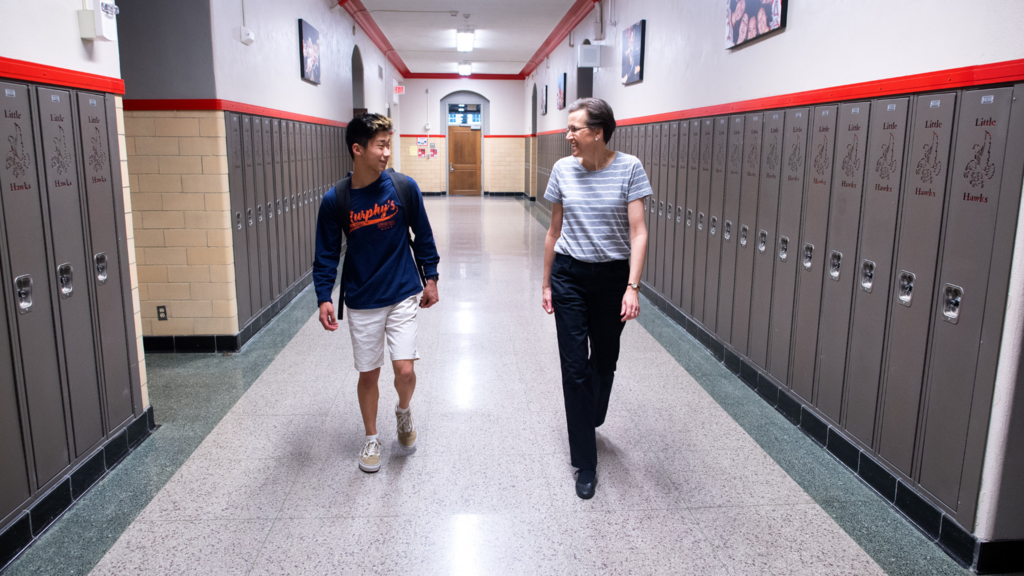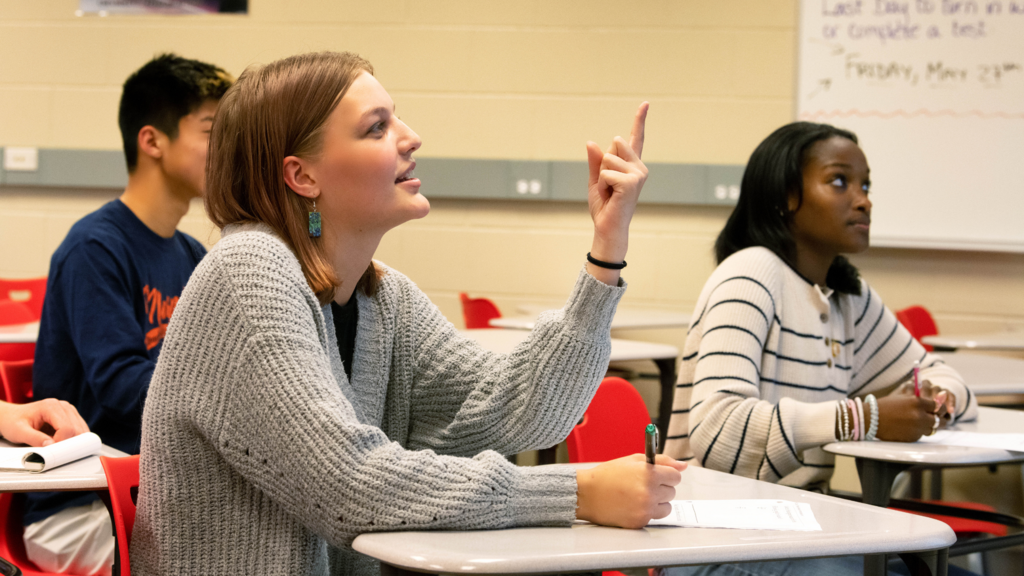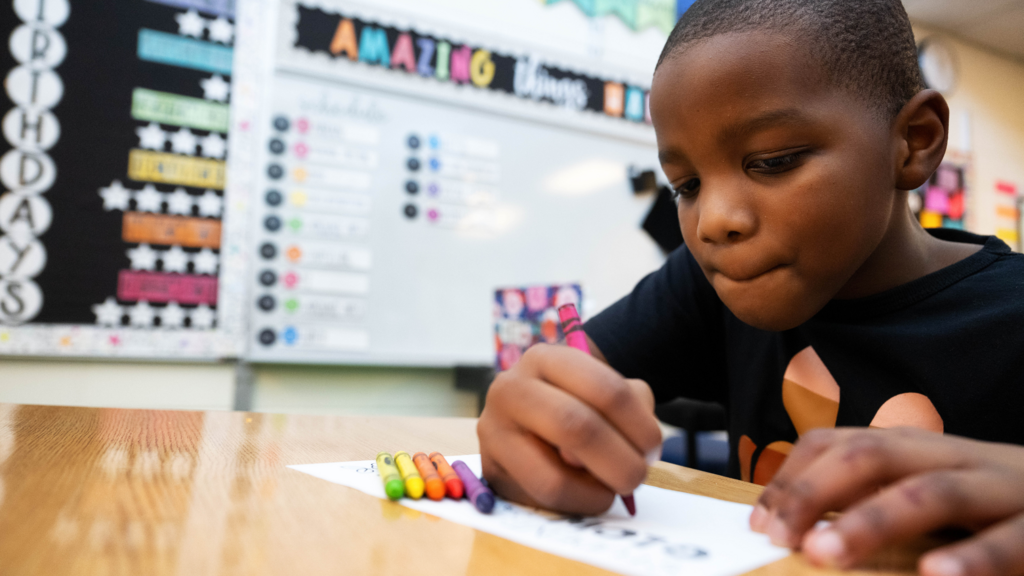Professional Development
On your time, at your pace.
Develop a better understanding of practices that impact your life and the lives of your students. Our online learning offerings feature social and emotional learning competenices and interventions, wellness best practices, and behavior change guidance to nurture holistic well-being.

Mental Health Lightning Learning for Educators
This learning opportunity offers exclusive access to a selection of highly requested presentations from the 2024 Iowa BEST Summit (September 15-16, 2024). Designed to support educator, student, and school well-being, these short video sessions provide practical strategies and evidence-based approaches to improving learning environments, strengthening interventions, and fostering positive school climates. Participants will gain valuable insights into systems, data-driven practices, and research-based strategies that promote success for all students.
Learning Goals:
- Explore evidence-based strategies that enhance educator, student, and school well-being.
- Identify practical approaches to strengthening school systems, interventions, and classroom practices.
- Apply key takeaways to create supportive and effective learning environments.

Balancing Boundaries: Ethics and Healthy Relationships in Education
This asynchronous module provides educators with essential guidance on maintaining professional ethics and setting healthy boundaries while fostering meaningful relationships with students and their families. As teachers strive to create supportive and impactful connections, it is crucial to navigate the fine line between being approachable and maintaining professionalism. This module explores strategies to build strong relationships without compromising ethical standards or licensure requirements, ensuring educators can support their students effectively and responsibly.
Learning Goals:
- Understand ethical standards.
- Recognize boundary challenges and signs of potential boundary issues in interactions.
- Implement strategies for healthy boundaries.
- Foster positive and professional relationships with students and families.

Educator Wellness Podcast - Season 3
This course, spanning 8 podcast episodes, has been designed to bring together education professionals to learn about the importance of educator wellness and its connection to social-emotional-behavioral health (SEBH). Topics this season include collective action in K-12 education, finding your authentic teaching voice, school avoidance, advancing social connection, strong family-educator relationships, and more!
Learning Goals:
- Examine personal wellness strengths and areas of growth that impact your overall well-being.
- Identify key issues in education that are impacting your life and work.
- Analyze strategies and skills that can improve your well-being.
- Analyze strategies and methods that educators can use to improve the well-being of school systems.
- Investigate how community systems directly impact school systems and vice versa.

Professional Learning and Training
Each module takes ~3 hours to complete. Educators will engage in videos, readings, and reflection boards.

Expert Instruction
From experts across teaching and learning, social work, psychology, counseling, and psychiatry.

License Renewal Credit
Potential to receive up to 3 Iowa licensure renewal credits.
Tier 1 Learning Experiences

Social, Emotional, Behavioral Health (SEBH) Overview
How do we define SEBH? What does state policy say? What does the research say? What are the core competencies? How do I use them in my own life and practice? How do I teach them to my students? All of these questions and more will be explored.
Learning Objectives:
- Gain an understanding of and be able to discuss current Iowa state SEBH policy.
- Name and understand the 5 CASEL SEL Competencies.
- Identify and plan for implementation and integration of the 5 CASEL SEL Competencies within a classroom.

Positive Behavior Interventions and Supports (PBIS)
Provides universal, preventive, proactive schoolwide management strategies that are designed to meet the needs of all students. This learning module will address systems, practices, and data necessary to ensure effective Tier 1 implementation, that is provided equitably to all students.
Learning Objectives:
- Describe the core features of Tier 1 PBIS.
- Define the rationale for implementation of Tier 1 PBIS.
- Explain the process for implementing Tier 1 PBIS.
- Identify the team and data systems needed to monitor implementation of Tier 1 PBIS.

Establishing Bully-Free Classrooms and Schools
In this module, you will learn evidence-based strategies for establishing bully-free schools through school-wide training and implementation of universal bully prevention interventions for K-12 schools, while providing targeted and individualized interventions for students who are at-risk for escalated rates of bullying involvement.
Learning Objectives:
- Understand the defining characteristics of bullying and associated roles.
- Recognize predictive and protective factors associated with bullying involvement.
- Gain insight into various school-wide prevention methods.

Understanding Childhood Trauma and Mitigating Stress
This professional learning experience will introduce you to the concept of childhood trauma, through exploration of Adverse Childhood Experiences (ACEs) and other measures of psychological trauma, and explore the situated contexts that surround a developing individual as it relates to ACEs. You will also learn about the distinction between stress and trauma and explore the role of schools in mitigating– and preventing– future trauma from occurring.
Learning Objectives:
- Apply strengths-based views to understanding children and trauma.
- Differentiate between stress and trauma.
- Understand the connection between trauma and schooling.
- Identify specific educator practices that can mitigate stress and trauma responses.

Assisting Educators in Developing an Enduring Self-Care Regimen
What is compassion fatigue and why are educators particularly vulnerable? Instead of compassion fatigue educators want to experience compassion satisfaction. Compassion fatigue is the cost of caring and educators pay a high price. In this module, you’ll learn enduring self-care strategies to prevent compassion fatigue from creeping into your life and lifelong strategies to achieve compassion satisfaction.
Learning Objectives:
- Increase knowledge about compassion fatigue and its impact on education professions.
- Enhance awareness of adaptive and maladaptive coping mechanisms when dealing with day-to-day stressors.
- Augment their coping skills to mediate the impact of secondary traumatic stress in the work environment.

Suicide Prevention and Postvention: What Educators Need to Know
This professional learning experience will increase your understanding of suicide prevention, intervention, and postvention in an education context, and it will offer an array of evidence-based tools that school staff can use to recognize suicide risk and respond effectively.
Learning Objectives:
- Identify the five (5) major stages in the progression of risk that can lead to suicide (the Suicidal Crisis Path).
- Categorize programs and activities according to five (5) intervention points in the Suicidal Crisis Path.
- Summarize risk assessment using risk scales such as the Columbia Suicide Severity Rating Scale (C-SSRS).
- Outline a Safety Plan with six (6) key sections that provide practical guidance for managing suicide risk.
Tier 2 Learning Experiences

Using SEL Competencies to Support Belonging
This 3-part series discusses ways that SEBH and SEL practices support and advance belonging in our schools. Learn how SEL advances belonging by examining authentic family-school community partnerships grounded recognizing and understanding all cultures within the community.
Learning Objectives:
- Gain an understanding of Transformative SEL.
- Receive tangible resources to plan for and facilitate implementation of equity concepts and practices in school-day activities.
- Learn about and discuss activities to incorporate and involve SEL in the student sharing of lived experiences and the family-school partnership.

Positive Behavior Interventions and Supports (PBIS) Tier 2
Positive behavioral interventions and supports (PBIS) provides universal, proactive schoolwide preventative strategies that are designed to meet the needs of all students. This learning module will address the systems, practices, and data necessary to ensure effective Tier 2 implementation, that is provided equitably to all students that need additional supports beyond the Tier 1 level.
Learning Objectives:
- Describe the core features of Tier 2 PBIS.
- Define the rationale for implementation of Tier 2 PBIS.
- Explain the process for implementing Tier 2 PBIS.

Suicide Prevention Legal Issues and Best Practices for Suicide Postvention
This professional learning experience will increase the understanding of school-based mental health professionals* around their role in suicide prevention, intervention, and postvention practices in their schools, and it will offer an array of evidence-based tools that these professionals can use to recognize suicide risk and respond effectively. *School psychologists, school counselors, social workers, crisis response team members, and behavior interventionists.
Learning Objectives:
- Become familiar with student behaviors related to suicide and the components of comprehensive suicide prevention, intervention and postvention in schools.
- Understand the importance of responding immediately to screen students when a student is suspected of being at-risk for suicide and the importance of parent notification, referral to community-based professionals and follow up at school.
- Identify the goals of suicide postvention and the best practices resources for suicide postvention in schools.
- Understand key legal issues in lawsuits filed against schools after a student suicide and the lessons for suicide prevention from the legal causes.
*School psychologists, school counselors, social workers, crisis response team members, and behavior interventionists.

Establishing Bully-Free Classrooms and Schools – Tier 2 Practices
This module is designed to provide an overview of bullying prevention within an MTSS framework, with a focus on Tier 2 interventions. This module is divided into three sections, including an introduction to Tier 2 practices, classroom approaches, and small group approaches. Additionally, this module provides intervention approaches that directly address social and communication skill development and acquisition, as these two domains have been cited as predictive of bullying involvement.
Learning Objectives:
- Develop a deeper understanding of bullying prevention for youth at-risk for increased involvement.
- Recognize the importance of using behavioral risk screeners to identify youth who are at escalated risk for bullying involvement.
- Participants will increase their understanding of how their identity and personal values impact the decisions they make about their well-being.
- Establish a foundational knowledge of implementing social skills programming for youth at-risk for bullying involvement.

Identifying our 8 Dimensions of Wellness and Creating a System of Support
This module explores the interconnectivity of the 8-dimensions of wellness, how a person’s values and identity shape personal wellness, practices, and habits, and what educators can do to create a system of support for their personal and professional well-being.
Learning Objectives:
- Explain the difference between wellness and well-being.
- Increase knowledge about the 8 dimensions of wellness.
- Increase understanding of how identity and personal values impact the well-being decisions.
- Learn effective strategies for creating a system that supports their well-being.

Trauma Informed Restorative Justice
During this module, we will explore, discuss, and apply concepts that support a Trauma Informed Approach to Restorative Justice. Each participant will engage in reflective exercises, shared learning when applicable; explore different ways to think about key concepts in both Restorative Justice (RJ) as well as Trauma Informed Care (TIC). The goal is to present opportunities to gain new awareness, define your understanding of RJ and TIC, and describe how to apply this information in meaningful ways.
Learning Objectives:
- Understand the foundations of restorative justice and identify effective practices for using a trauma-informed approach with students.
- Develop skills for creating a safe and supportive environment, engaging all parties involved, and addressing power imbalances in trauma-informed restorative justice processes with students.
- Explore case studies and real-world examples of trauma-informed restorative justice practices with students.
Tier 3 Learning Experiences

Suicide Prevention and Postvention: Working with Families and Communities
This professional learning experience will provide school administrators and personnel with the tools needed to provide information for families and community members regarding suicide and other related mental health issues.
Learning Objectives:
- Identify effective strategies for helping families and community members learn about suicidality, prevention, and postvention in schools.
- Recognize critical roles district and school personnel play in supporting families and community members through suicide postvention.
- Use effective strategies for supporting suicide prevention and postvention efforts with families and communities.

Trauma Informed Family Engagement
This learning module has been designed to help educators and school administrators understand the importance of engaging families in bilateral learning and conversation, specifically families who have experienced trauma either in or outside the school system. We will also review evidence-based strategies that can be used to enhance family engagement and meet family needs and expectations related to the learning and development of their child/children.
Learning Objectives:
- Understand the foundations of family/caregiver engagement.
- Understand the role of a trauma-informed mindset with existing strategies to support children and families who have experienced trauma.
- Learn effective practices for using a trauma-informed approach for schools as they engage with families/caregivers.
- Use the ARCCH Model of Resilience to inform family engagement.

An Inclusive Approach to School Mental Health
Teaching skills for learning has been found to have a positive impact on academic achievement by improving students’ self-awareness, self-management, social awareness, relationship skills, and responsible decision-making abilities. In this module, you will work to better understand the research that supports these findings and practice how to present these findings to school community members.
Learning Objectives:
- Differentiate between practices for evidence-based and evidence-informed skills for learning.
- Discuss how research indicates that skills for learning programs contribute to learning growth in math and literacy.
- Articulate how research indicates that skills for learning programs contribute to healthy well-being and safe schools.
- Summarize how research indicates that skills for learning develop critical skills that promote future readiness.

Establishing Bully-Free Classrooms and Schools – Tier 3 Practices
This module is designed to provide an overview of bullying prevention within an MTSS framework, with a focus on Tier 3 interventions. This module is divided into three sections, including an introduction to Tier 3 practices, Functional Behavior Assessment and Behavior Intervention Planning, and Tier 3 Intervention Recommendations. Specifically, this module focuses on assessing and supporting individual behaviors that are associated with escalated risk for bullying involvement. The focus of this module will hinge on understanding behavioral development and reinforcing new behaviors.
Learning Objectives:
- Develop a deeper understanding of individualized programming for youth at risk for bullying involvement.
- Recognize the importance of direct instruction when teaching and reinforcing new skills.
- Understand strategies for conducting functional behavior assessment and developing behavior intervention plan.
- Establish a foundational knowledge of implementing interventions that are individualized based on student need.

Educator Well-Being and Resilience
We often focus on the resilience of students in schools. However, we know how critical it is to support the resilience of educators, so that they can support the resilience of students. This module focuses on the resilience of educators. You will learn about what educator resilience is, the unique challenges educators face in maintaining resilience, and effective practices for enhancing educator resilience.
Learning Objectives:
- Understand what educator resilience is and the role it plays in overall well-being.
- Understand how educator resilience impacts student resilience and well-being.
- Learn effective strategies for enhancing their own resilience.

Positive Behavior Interventions and Supports (PBIS) – Tier 3 Practices
This module will address systems, practices, and data necessary to related to Tier 3 supports that are designed to meet the individual needs of student.
Learning Objectives:
- Describe the core features of Tier 3 PBIS.
- Define the rationale for implementation of Tier 3 PBIS.
- Explain the process for implementing Tier 3 PBIS.
- Identify the team and data systems needed to monitor implementation of Tier 3 PBIS.
